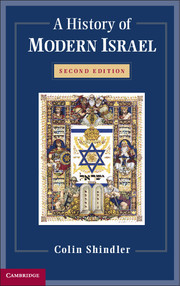Book contents
- Frontmatter
- Contents
- Illustrations
- Maps
- Acknowledgements
- Glossaries
- Chronology
- Preface to the second edition: Towards 2020
- Introduction
- 1 Zionism and security
- 2 The Hebrew Republic
- 3 New immigrants and first elections
- 4 The politics of piety
- 5 Retaliation or self-restraint
- 6 The Rise of The Right
- 7 The Road to Beirut
- 8 Dissent at Home and Abroad
- 9 An insurrection before a handshake
- 10 The end of ideology?
- 11 The Killing of a Prime Minister
- 12 The Magician and the Bulldozer
- 13 ‘He does not stop at the red light’
- 14 An unlikely grandfather
- 15 A Brotherly Conflict
- 16 Bialik's bequest?
- 17 Stagnation and Isolationism
- 18 An Arab Spring and an Israeli winter?
- Bibliography
- Index
- References
7 - The Road to Beirut
Published online by Cambridge University Press: 05 March 2013
- Frontmatter
- Contents
- Illustrations
- Maps
- Acknowledgements
- Glossaries
- Chronology
- Preface to the second edition: Towards 2020
- Introduction
- 1 Zionism and security
- 2 The Hebrew Republic
- 3 New immigrants and first elections
- 4 The politics of piety
- 5 Retaliation or self-restraint
- 6 The Rise of The Right
- 7 The Road to Beirut
- 8 Dissent at Home and Abroad
- 9 An insurrection before a handshake
- 10 The end of ideology?
- 11 The Killing of a Prime Minister
- 12 The Magician and the Bulldozer
- 13 ‘He does not stop at the red light’
- 14 An unlikely grandfather
- 15 A Brotherly Conflict
- 16 Bialik's bequest?
- 17 Stagnation and Isolationism
- 18 An Arab Spring and an Israeli winter?
- Bibliography
- Index
- References
Summary
Menachem Begin's Leadership
Menachem Begin often wrestled with depression. His condition became worse once he had attained the premiership in 1977, when decision-making was sometimes defined by his highs and lows. His autocratic nature led many opponents to either voluntarily leave his circle or be ousted. From the old Revisionists loyal to Jabotinsky's memory (1951) to young upstarts such as Ehud Olmert (1966), to military men Ezer Weizmann (1972) and Moshe Dayan (1979), the pattern of eventual exit remained the same. Begin's need to be respected but unchallenged by his colleagues was reflected in the fact that he was probably the only democratic leader ever to have lost eight consecutive elections, but still continued in office. One former Israeli ambassador to Great Britain commented that while he swayed from ‘elation to depression, from stagnation to hyperactivism, from chaotic disarray to monolithic uniformity’, he was endowed with tremendous stamina and ‘the patience of a hunter in ambush’:
Begin's ability to deal with political adversaries – and competitors within his own camp – is unmatched. Weizmann, Dayan, Tamir, Hurwitz had to leave his government when they had reached the end of the rope so lavishly provided to them by Mr Begin. He did not drop them, he squeezed them out, one by one.
Mapai, too, for its own political interests, had heaped a fair amount of opprobrium on Begin. Ben-Gurion wrote in his diary that the very existence of Herut was ‘a black stain on Israeli democracy’. Yet Begin was an astute practitioner of the black arts of Israeli politics. Until his election, Begin had repudiated most peace proposals and many conciliatory statements.
- Type
- Chapter
- Information
- A History of Modern Israel , pp. 147 - 174Publisher: Cambridge University PressPrint publication year: 2013



